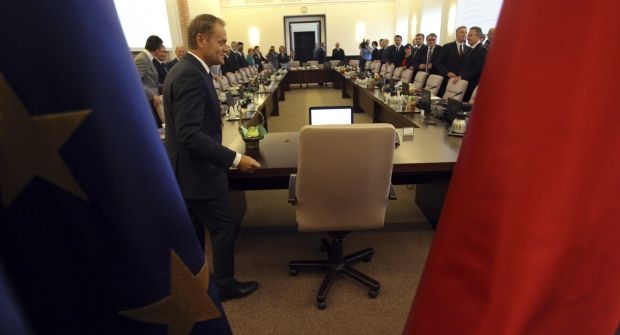
The New Polish Government. What Can Ukraine Expect?
The new Polish government received a vote of confidence from the Parliament. The political program presented by Prime Minister Ewa Kopacz contained a lot of promises, realization of which during the period of one year will be difficult. A large part of the Prime Minister’s speech was devoted to the situation in Ukraine and the security policy. What kind of policy can be expected by Ukraine on the part of Polish authorities?
Situation of the recent change of power in Poland can be described as historic. Practically for the first time in the history of the 25-year old independent Polish state, such a necessity was not an effect of a crisis in the state or in the ruling coalition, but resulted from Poland’s success in the field of international politics. In late August, the incumbent since 2007, Prime Minister Donald Tusk was elected as President of the European Council.
For several months, the media speculated about such possibility, as well as about incitements made by German Chancellor Angela Merkel towards Tusk. The head of government was consistently denying the reports about his efforts to secure one of the most important positions in the European Union. Therefore, Tusk’s agreement to take this office, and his departure from national politics was received in Poland with a big surprise.
The Era of Tusk Is Over
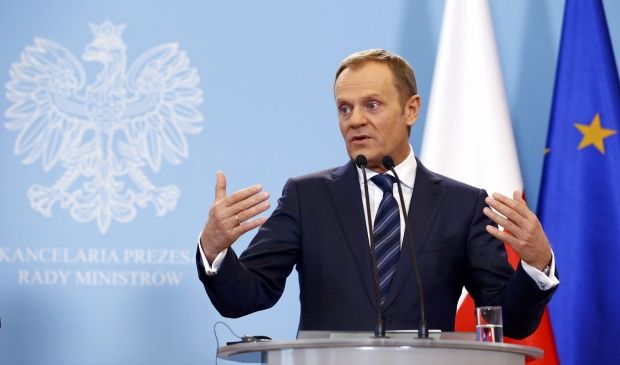
Such a decision of European leaders marked the end of a long period of domination of the outgoing head of the government in Polish politics. Tusk was the first Prime Minister in the modern history of the Polish state, who succeeded two times in a row to win elections and maintain power. Under his leadership, the Civic Platform party (Platforma Obywatelska) was consecutively winning local, parliamentary and European elections, and its candidate Bronislaw Komorowski won the presidential elections in 2010.
Donald Tusk's one-person leadership in the party meant that the outgoing head of the government would indicate his successor. The media, however, speculated that in such situation President Komorowski will want to push through his own candidate. It is difficult to take such reports seriously. Next year will bring presidential elections, in which the incumbent president will apply for re-election. Komorowski realizes that without the organizational support from the Civic Platform his campaign is not going to be possible, and good relations with the party are crucial for him in the fight for re-election.
Tusk’s indication of Parliament’s Chairman Ewa Kopacz for the position of the new Prime Minister was not a surprise. For several years, she belonged to the closest group of associates of the former head of government and Tusk highly trusts her, which results also from their relations in private life. Therefore, this nomination sparked a wave of speculations that Kopacz will not be able to act as independent Prime Minister, but will be merely a puppet in the hands of Tusk, who will control the work of the government from the back seat.
The New Old Government?
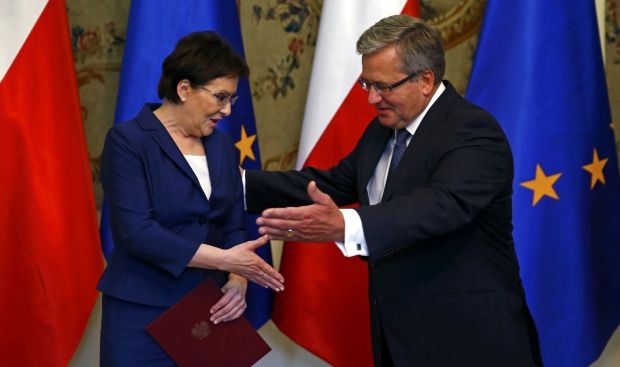
Ewa Kopacz’s decisions concerning the composition of the new Council of Ministers were eagerly awaited in Poland. She emphasized in many statements that this is going to be a government of hand-picked ministers, who are a good fit for the vision and political program which she has authored. Kopacz was however in a difficult situation of taking the office after Prime Minister Tusk. Replacement of the majority of ministers would mean a kind of censure on the predecessor. In turn, leaving most of them posed a risk for the future Prime Minister on charges of pleasing Tusk and a lack of political independence. In fact, such was the majority of comments after the presentation of candidates for ministers. Ewa Kopacz decided to replace merely 5 of the 18 heads of ministries.
Sikorski - Schetyna
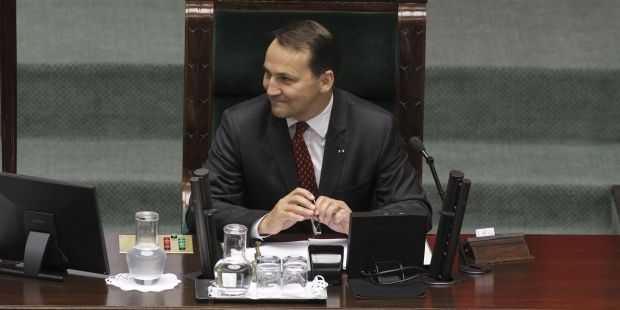
This does not mean, however, that the personnel decisions of the new Prime Minister were not a surprise. Quite the opposite. The biggest storm was caused by the change on the position of Foreign Minister, the chief reason of which was not exactly explained until this day. Former Foreign Minister Radoslaw Sikorski was replaced by Grzegorz Schetyna. Many experts, politicians from the ruling coalition, and even President Komorowski indicated that a change in this position during the war in Ukraine, and a very tense international situation is a wrong decision. Such arguments, however, did not convince the Prime Minister Kopacz, who decided not to leave Sikorski in her government.
The most frequently mentioned candidate for Foreign Minister was a close associate of Tusk and a former Finance Minister, Jacek Rostowski. His candidacy, however, was blocked by President Komorowski, who according to unofficial reports, did not want to agree to a person with no diplomatic experience. This information is surprising in the context of consent Bronislaw Komorowski gave on candidacy of Grzegorz Schetyna, who also does not have any significant international experience.
The Great Return
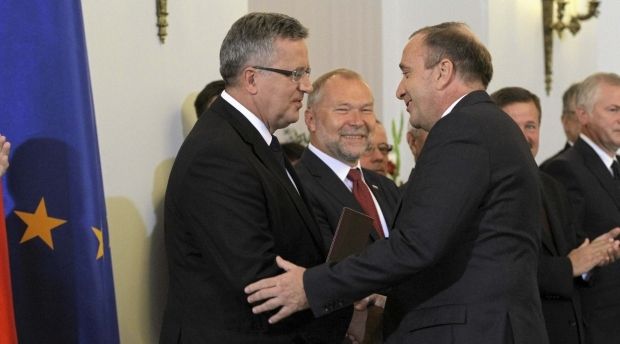
After many years Schetyna returns to big politics and its entry into government was a great surprise. Several years ago, he belonged to the circle of closest associates of Tusk, and as a member of government, he held the position of first deputy prime minister and interior minister. However Tusk recognized Schetyna as a potential competitor for leadership in the party and in the following years he led to the total marginalization of his position. He was removed from the government in 2009, under the pretext of gambling scandal, which involved some prominent politicians from the Civic Platform. Later, he was also acting as a head of CP’s parliamentary faction and the Chairman of Parliament. After the 2011 elections, Tusk decided to entrust the latter to Ewa Kopacz, and weakened one more time, Schetyna became the head of the Parliamentary Commission on Foreign Affairs.
In the commentary for UNIAN Krzysztof Szczerski, member of the Commission and a former Deputy Foreign Minister in the government of the Law and Justice party (Prawo i Sprawiedliwość) stresses that this is a prestigious Commission, but certainly did not match the ambitions of the former Chairman of Parliament and Deputy Prime Minister. "Nomination of Schetyna for this position meant the removal of him as a former ally of Tusk from the main stream of Polish politics and pushing him aside. Schetyna had not exhibited greater interest in international affairs, focusing his attention on national politics" - emphasizes Szczerski. He acknowledges, however, that over the past three years in the Foreign Affairs Commission Schetyna has gained valuable experience and knowledge of international issues. Supporters of his nomination emphasize, that thanks to this he has sufficient competence to perform this important function and will perform well his duties as the head of Polish diplomacy.
It is worth, however, to ask about this nomination in the context of constantly putting Schetyna aside in the shadow by Donald Tusk. Why the sudden decision about his great return to the government? It is largely associated with the internal rivalry for leadership in the Civic Platform. It should not be forgotten that Donald Tusk’s leave to Brussels is freeing up also the position of the head of the party. On his departure he designated Ewa Kopacz as a temporary head of the party. However, Schetyna began to demand running immediate elections for the head of Civic Platform and announced that he will take part in them. Inclusion of Schetyna into the government headed by Kopacz has weakened his position as her competitor for the power in the party and ensured relative loyalty of the influential Civic Platform’s faction led by him.
What Kind of Foreign Policy?
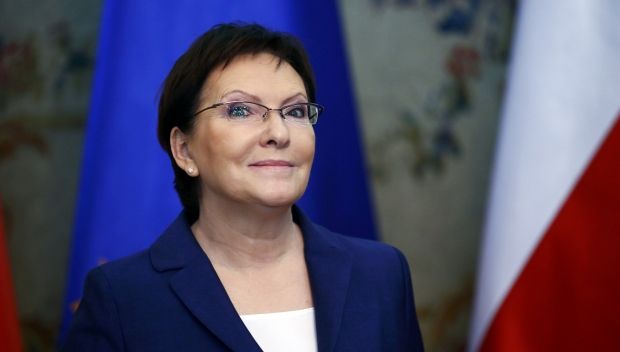
The change of government and the Minister of Foreign Affairs during the very tense international situation caused a lot of questions about the Polish stance towards the conflict in Ukraine. Inquired before swearing into the office about the issue of the supply of arms to the Ukrainian state, Prime Minister Kopacz gave a surprising answer, which suggested that Poland will not be closer involved into the affairs in Ukraine. "I can imagine what I would do if a man waving a sharp instrument, or holding a gun in his hand showed up in the street. My first thought would be that behind my back are my home and my children. So I would run into the house, shut the doors, and take care of my children "- symbolically spoke about the threat posed by Russia. ”Our security, our country, our home, our children! This is most important!"- emphasized Prime Minister Kopacz.
Representatives of the ruling coalition tried to differently explain this unfortunate announcement, but it has met in Poland with a large wave of criticism and provoked questions whether the new government intends to revise its policy towards Ukraine and the conflict in the East. Therefore, the political program to be announced by Prime Minister Kopacz was being awaited with great interest, as was the more accurate vision of Polish foreign policy.
Policy Towards Ukraine
The political program presented last Wednesday by Prime Minister Kopacz was one of the shortest speeches of this kind after 1989. During 45-minute speech the Prime Minister made a lot of promises, the implementation of which within one year will be very difficult. In her speech the Prime Minister devoted a lot of space to issues regarding international situation and defense policy. She assured that the government will guarantee safety to the Poles and announced that from 2016 Poland will increase its military spending to 2 percent of GDP, so that the army would annually receive an additional approx. $ 267 million for modern equipment.
Kopacz also called on parliamentarians to build an understanding across boundaries in the field of Polish foreign and security policies. She added that the crisis in Ukraine showed clearly how important in the face of authoritarianism and chaos is the solidarity of democratic states. She stressed that the task of the Polish government will be striving to maintain the unity and solidarity of the democratic forces in respect to the conflict in the East.
The head of the Polish government also stated that Polish policy towards Ukraine will be pragmatic. "For Poland and its citizens the key matter is the cessation of fighting in Ukraine and the consolidation of the Ukrainian state. We hope that the recent talks on the cessation of hostilities will bring results" - emphasized the Prime Minister. She noted clearly, however, that "this does not mean consent to the annexation of the territory of the sovereign Ukrainian state, nor acceptance of change of borders in Europe by force. It is a matter of fundamental principles of the world to which we belong."
The Prime Minister also confirmed support for the European course of development of Ukraine. She added, however, that Poland is not able to replace Ukrainians themselves in the process of reforming the state, but announced offering consistent help in the political, constitutional, economic and military transformation.
Referring already during the parliamentary debate to the above statement, Member of the Parliament Krzysztof Szczerski asked why the Parliament has not yet received the ratification documentation of the association agreement between Ukraine and the European Union. "Maybe talking about aid to Ukraine, it would be worth making a particular move? Where are these documents? When will the Polish Parliament be finally able to take up the issue of this agreement? We are already running late considering our region. Most of the countries that favored Ukraine have already ratified the agreement. Why Poland must be the last in this case?" - asked Szczerski. In the commentary for UNIAN the former deputy head of Polish diplomacy stressed that Poland should ratify this document as the first state, and in a symbolic way refer to the recognition of Ukraine's independence in 1991, confirming its support for Ukraine's European aspirations. To answer this question the head of the government announced that the ratification documents will be submitted to the Parliament in October. This month, the new head of the Foreign Affairs department will also present to the lower house of Parliament plans and priorities concerning the foreign policy of the new government.
In her inaugural speech Ewa Kopacz referred directly to former Prime Minister Tusk saying that his time in Polish politics has come to an end, and as of today she is running the country. In the coming months, however, the new Prime Minister will have to prove her independence and leadership in the party but primarily fulfill the many promises made to the public. It is not an easy task, given the difficult period of three election campaigns that are coming soon. The future of Ewa Kopacz, therefore, will depend on the result of elections, and today the question remains open whether the new Prime Minister will go to history as a failed experiment of Donald Tusk, or will she become the Chancellor Angela Merkel of Polish politics.
Piotr Bajor is an Assistant Professor at the Jagiellonian University in Kraków

